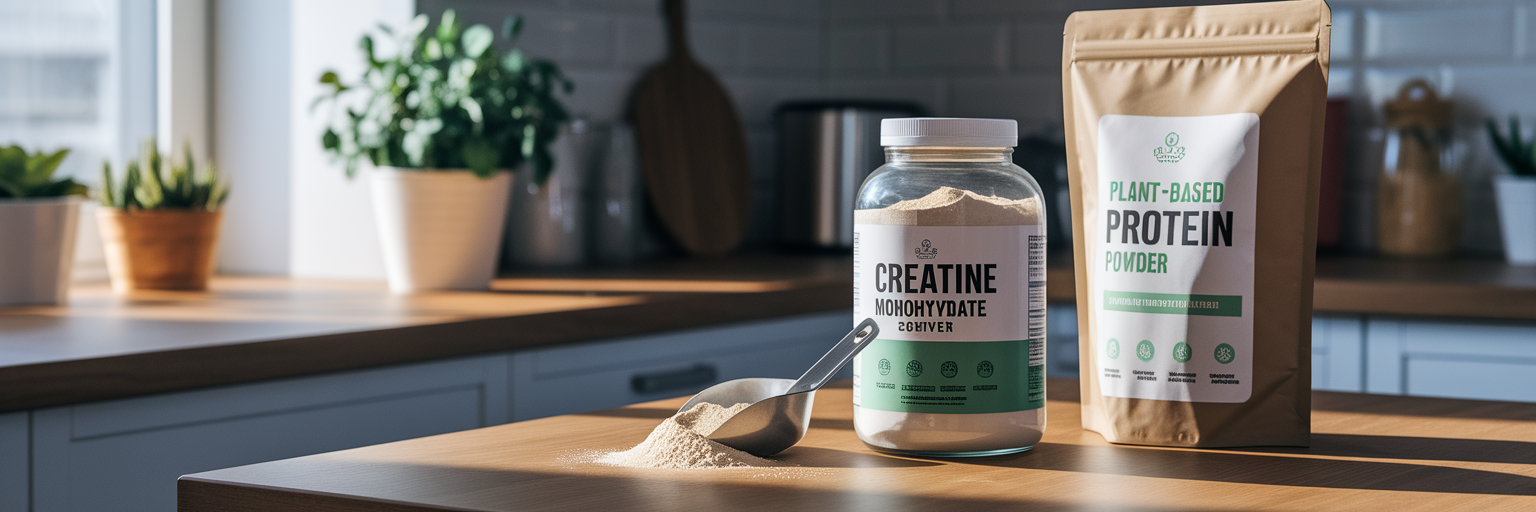Why This Combo is So Effective for Plant-Based Athletes
If you're committed to a plant-based lifestyle and serious about your fitness, you've likely wondered how to optimize your results. The combination of vegan protein and creatine is a powerful strategy that works in perfect harmony to support your goals. Think of it this way: protein provides the essential "bricks" your body needs to repair and build muscle tissue after a workout. Creatine, on the other hand, is the high-energy "construction crew" that enables you to work harder and with more intensity, signaling your body to build more muscle in the first place.
For those on a plant-based diet, this combination is particularly effective. Creatine is primarily found in animal products, so vegans and vegetarians naturally have lower baseline levels in their muscles. This isn't a disadvantage; it's an opportunity. When you begin supplementing, you're essentially filling a key nutritional gap. This is how to take creatine vegan style for a noticeable boost. The improvements in strength and power can feel more significant because you're starting from a different baseline than an omnivore.
Of course, it's important to set clear expectations. Supplements are tools to enhance your efforts, not shortcuts. Their true power is activated when paired with consistent training and a well-rounded diet. When you have those fundamentals in place, this duo can help you push past plateaus and build strength more effectively. For more insights into plant-based nutrition, feel free to explore the articles on our blog.
Choosing the Right Vegan Protein
With so many options on the market, picking the right vegan protein can feel overwhelming. But understanding a few key principles will help you choose with confidence, ensuring you get a product that truly supports your muscle-building journey.
Beyond a Single Source
You'll often see vegan proteins made from sources like pea, soy, rice, or hemp. The goal is to find a "complete protein," which simply means it contains all nine essential amino acids your body can't produce on its own. While soy protein is complete, other popular sources like pea and rice are not when consumed alone. This is why the source matters and leads directly to the next point.
The Power of Protein Blends
This is where smart formulation comes in. The best vegan protein for muscle development is often a blend of different plant sources. For example, combining pea protein (which is high in lysine) with rice protein (which is high in methionine) creates a complete and robust amino acid profile. This synergy ensures your muscles receive the full spectrum of building blocks needed for optimal repair and growth after a tough workout.
What to Look For on the Label
When you're ready to choose, keep an eye out for these markers of quality. A quick label check can tell you everything you need to know:
- Third-Party Testing: Look for seals from organizations like NSF for Sport or Informed-Sport. This certification verifies that the product is pure and free from banned substances.
- Protein Per Serving: Check the nutrition facts to ensure you're getting a meaningful amount of protein, typically 20-30 grams per scoop.
- Minimal Ingredients: A shorter ingredient list is often a good sign. Scan for low amounts of added sugars, artificial flavors, or unnecessary fillers. You can find more tips in our guide to the best protein powders.
The Power of Creatine for Vegans

Creatine is one of the most researched and effective supplements available, and for vegans, its benefits are even more pronounced. In simple terms, creatine acts as a rapid-recharge system for your muscles during short, intense bursts of effort. It helps your body regenerate its primary energy currency, ATP, allowing you to push out those crucial extra one or two reps in a set. Those are the reps that truly stimulate muscle growth.
As mentioned earlier, plant-based diets contain virtually no creatine, leading to lower natural stores in the body. Supplementing with a high-quality creatine monohydrate strategically bridges this dietary gap. It elevates your muscle creatine levels to an optimal state, which can lead to noticeable improvements in strength, power output, and overall workout performance. It’s a straightforward way to ensure your body has the fuel it needs for high-intensity training.
Interestingly, the benefits may extend beyond the gym. Research has begun to explore creatine's role in cognitive function. In fact, a study highlighted by the National Center for Biotechnology Information (NCBI) found that creatine supplementation in vegetarians supported cognitive processing and short-term memory. While more research is always welcome, it's a compelling additional benefit for those on a plant-based diet. If you're ready to experience these benefits, you can find our pure creatine monohydrate here.
Perfecting Your Timing for Maximum Impact
One of the most common questions we hear is, "When is the best time to take my supplements?" While it's easy to get caught up in the details, the science is actually quite straightforward and flexible. Let's clear up the confusion so you can build a routine that works for you.
You may have heard of the "anabolic window," a supposed 30-minute period after a workout where you must consume protein. The good news is that this window is much wider than once believed, likely lasting for a few hours. However, the post-workout period is still a prime time for nutrient absorption. Your muscles are more sensitive to nutrients like amino acids, making it an ideal time to refuel for recovery.
For this reason, a post workout vegan shake containing both protein and creatine is an incredibly efficient strategy. The protein provides the immediate resources for muscle repair, while the creatine begins the process of replenishing your muscles' energy stores. Adding a source of carbohydrates, like a banana or berries, to your shake can also help with creatine absorption by causing a small insulin response that shuttles nutrients into your muscle cells.
Above all, remember this: consistency is far more important than perfect timing. This is especially true for creatine, which works by saturating your muscles over time. Taking it daily, even on your rest days, is what delivers sustained results. Don't stress about hitting a specific minute; focus on making it a consistent habit. For some delicious inspiration, check out these easy vegan protein recipes.
Getting Your Dosages Right for Optimal Results

To get the most out of your supplements, it's important to use the correct dosages. Fortunately, the recommendations for both creatine and vegan protein are well-established and simple to follow. This approach removes the guesswork and sets you up for successful plant based muscle growth.
For creatine, you have two options. You can start with an optional "loading phase" to saturate your muscles more quickly. This involves taking 20 grams per day, split into four 5-gram doses, for 5-7 days. This is especially effective for vegans due to lower starting levels. After that, or if you choose to skip loading, the standard maintenance dose is a simple 3-5 grams per day. This is the proven amount for long-term benefits.
For vegan protein, the recommendation is just as clear. Aim for 20-30 grams in your post-workout window. This amount has been shown to be highly effective for stimulating muscle protein synthesis, the process that kicks off muscle repair and growth.
| Supplement | Optional Loading Phase (First 5-7 Days) | Daily Maintenance Dose | Notes |
|---|---|---|---|
| Creatine Monohydrate | 20 grams total (split into 4 x 5g doses) | 3-5 grams | Loading helps saturate muscles faster; maintenance is for long-term use. |
| Vegan Protein | Not Applicable | 20-30 grams post-workout | This amount is ideal for stimulating muscle repair and growth. |
Note: These dosages are based on established scientific literature for healthy, active adults. The creatine loading phase is optional but often recommended for vegans to see benefits more quickly.
Putting It All Together in Your Daily Routine
Now, let's make this practical. Integrating vegan protein and creatine into your day should be simple and seamless. The easiest method is the all-in-one post-workout shake. It’s convenient, effective, and takes just a couple of minutes to prepare.
Here is a simple recipe template to get you started:
- Combine 1 scoop of a high-quality vegan protein, like our chocolate vegan protein.
- Add 1 teaspoon (a 5-gram serving) of creatine monohydrate.
- Blend with 1 cup of your favorite plant-based milk (oat, almond, or soy work great).
- Toss in a banana or a handful of berries for healthy carbohydrates and extra flavor.
What about rest days? On days you don't train, still take your 3-5 gram maintenance dose of creatine to keep your muscles saturated. You can mix it with water or any other beverage. While you should aim to get most of your protein from whole food sources on these days, a protein shake can still be a convenient way to help you meet your daily protein goals.



